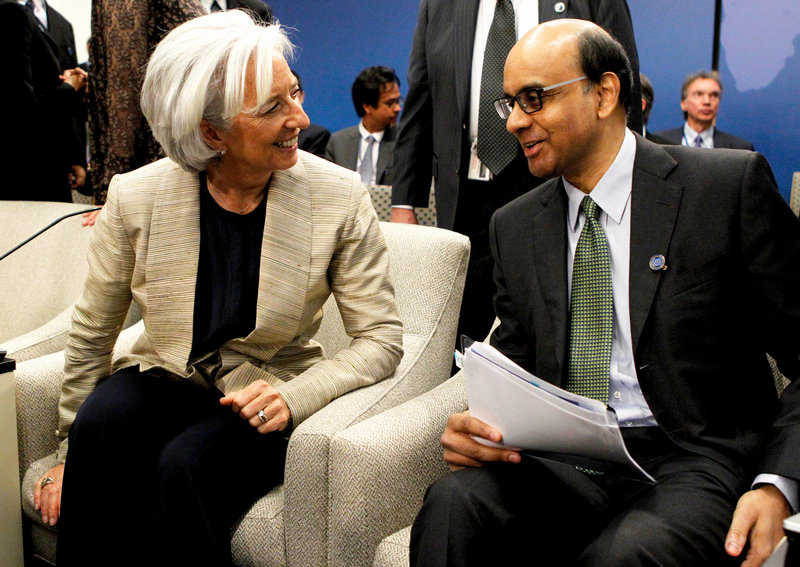WASHINGTON – World finance leaders issued a somber assessment on Saturday of the global economy, saying the recovery remains uneven with growth and jobs in short supply.
The steering committee for the 188-nation International Monetary Fund issued a final communique that called for decisive action to bolster growth. However, the major economies remained at odds over the best mix of policies to pursue.
“An uneven recovery is emerging but growth and job creation are still too weak. New risks are arising while several old risks remain,” the IMF group said.
“The commodity that is in shorter supply now is confidence,” Tharman Shanmugaratnam, the chairman of the IMF panel and Singapore’s finance minister, told reporters. “We need to regenerate optimism and confidence.”
The World Bank announced that its policy committee had approved a proposal to establish a goal of eliminating extreme poverty, defined as living on less than $1.25 per day, by 2030. It is estimated that there are still 1.2 billion people living in extreme poverty with sub-Saharan Africa accounting for more than one-third of the world’s extreme poor.
World Bank President Jim Yong Kim called this goal “an historic moment” for the world. “We are no longer dreaming of a world without poverty. We have set an expiration date,” Kim told reporters at a closing news conference.
Emma Seery, a spokesperson for Oxfam, the anti-poverty group, said while the World Bank’s target was welcome “we are concerned that it will duck the tough choices needed to reach it.”
The spring meetings of IMF and its sister lending agency, the World Bank, on Saturday followed two days of discussions among finance leaders of the Group of 20 nations, composed of traditional powers such as the United States, Japan and Germany and fast-growing developing nations such as China, Brazil and India.
The finance leaders sought to project an air of cooperation even though they were unable to resolve sharp differences that have risen to the surface following an initially botched bailout of Cyprus in March. The banking troubles in the small Mediterranean island country renewed fears that a prolonged European debt crisis still poses significant risks to the global economy.
The United States was represented at the finance meetings by Treasury Secretary Jacob Lew and Federal Reserve Chairman Ben Bernanke. The administration pushed for European nations to moderate their austerity programs of spending cuts and tax increases in favor of more stimulus to bolster growth and combat painfully high unemployment in countries such as Spain and Greece.
Copy the Story Link
Send questions/comments to the editors.



Success. Please wait for the page to reload. If the page does not reload within 5 seconds, please refresh the page.
Enter your email and password to access comments.
Hi, to comment on stories you must . This profile is in addition to your subscription and website login.
Already have a commenting profile? .
Invalid username/password.
Please check your email to confirm and complete your registration.
Only subscribers are eligible to post comments. Please subscribe or login first for digital access. Here’s why.
Use the form below to reset your password. When you've submitted your account email, we will send an email with a reset code.